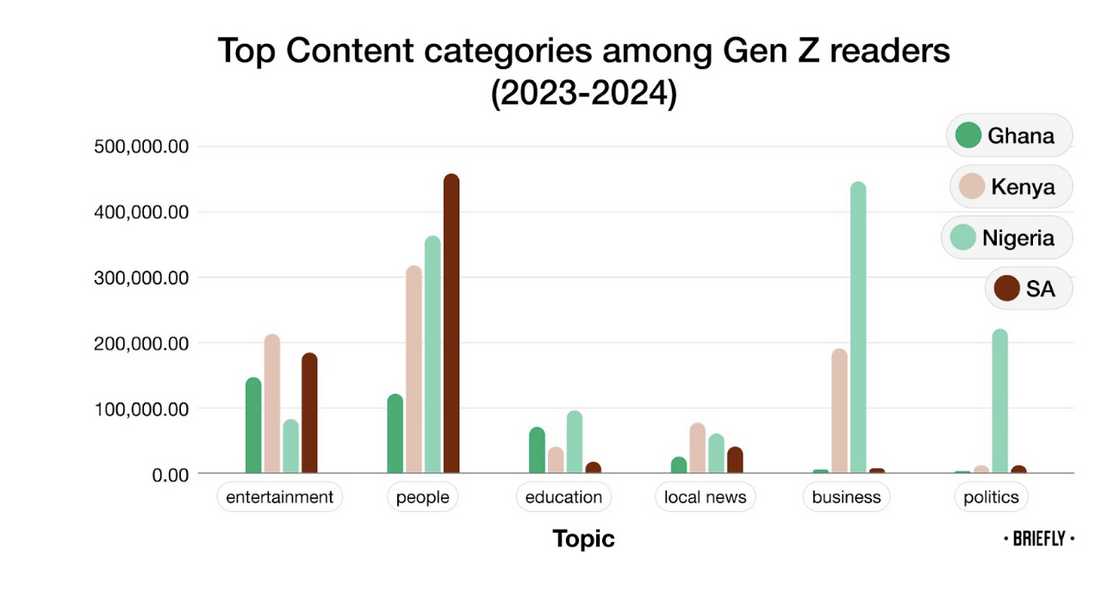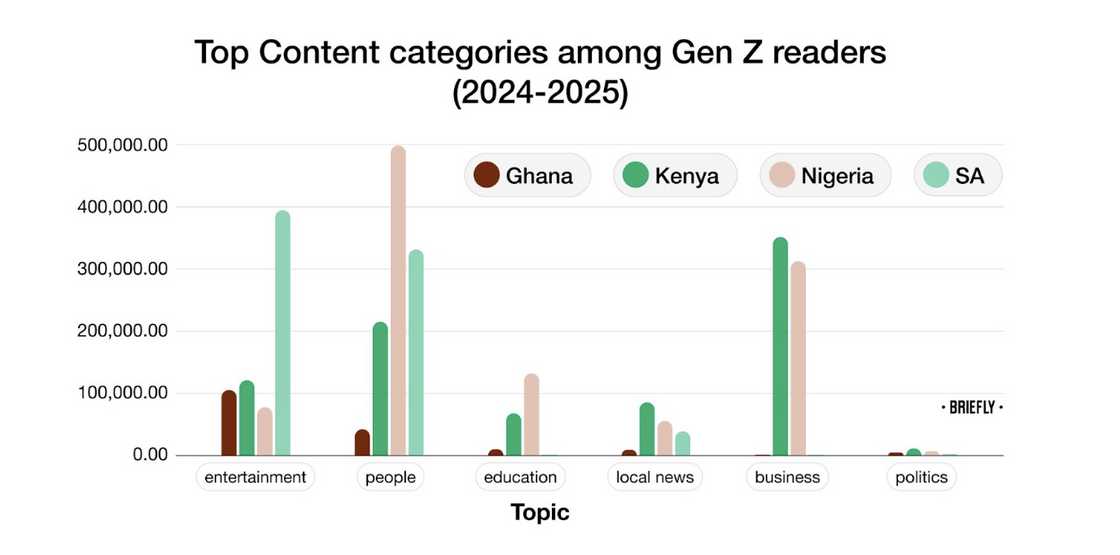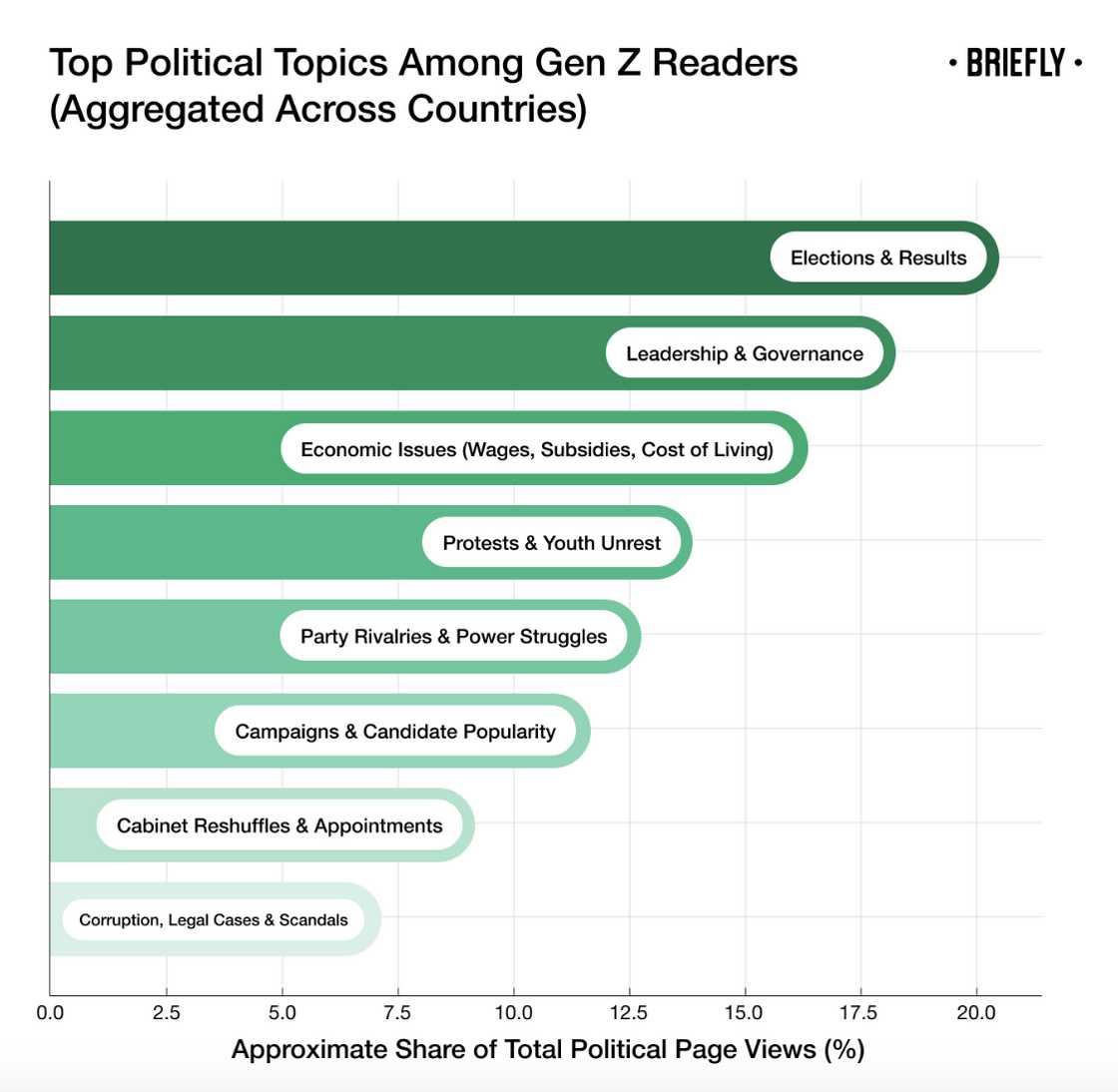Gen Z in South Africa: Rewriting the Digital News Rules
Across Africa, a quiet shift is unfolding in how young people consume news, and it's more profound than it seems. As Generation Z comes of age, they are changing the job market and the voting landscape of the entire continent.
Don't miss out! Join Briefly News Sports channel on WhatsApp now!
Legit, the media holdings behind top digital news platforms Briefly News, YEN News, Legit.ng, and TUKO News, recently conducted a two-year study to understand exactly what these young readers want. The research analysed the top 1,000 most-read articles each year between March 2023 and March 2025 across Nigeria, South Africa, Kenya and Ghana from Gen Z readers aged 18 to 24, those shaping the next two decades of Africa’s story. The studied content garnered over six million views across the chosen countries.
Africa’s Gen Z’s love for "people content" (personal stories, human experiences and relatable moments) stood out. But nuances emerged in each country. In Nigeria and Kenya, business and economic content drew strong attention, while in Ghana, entertainment and sports held sway. And then there was South Africa, where young people are especially keen on pop culture and local news.

Read also
"Where's our humanity?": Clip of a Zimbabwean pregnant lady being questioned by SA ladies trends

Source: Original

Source: Original
PAY ATTENTION: stay informed and follow us on Google News!
Across the four countries where Gen Z readers’ preferences were analysed, the top political themes of interest include elections, leadership, governance, protests and youth unrest, election campaigns and the like. This shows that, on average, this generation is very keen to have information on political and government issues, which are determinants of their future and well-being.

Source: Original
And what about South Africa’s Gen Z readers? Well,
- They have a large preference for entertainment and people news content
- Readers’ interest in business stories and educational news has declined over the last two years
- Local news content is relevant to the South African Gen Z, but it’s not dominant
- Political interest among the youth is low
South Africa’s Gen Z turns up the volume on pop culture
For South African Gen Z readers, the story making waves unfolds on stages, screens, and timelines. According to the Legit report, entertainment content has become dominant among young South Africans, overshadowing news about education, local affairs or even personal interest stories.
The surge isn’t subtle. In just two years, the volume of Gen Z readers engaging with celebrity news, viral TikTok trends, and music updates grew significantly, signalling a deep desire for media that resonates emotionally or offers a reprieve from everyday realities. It is not only about being entertained. It's also about connection and finding relevance in the shared language of pop culture.
A soft decline in human stories and serious reads
As entertainment rose, other categories took a step back. The once-reliable draw of human-interest stories, profiles, struggles and triumphs of ordinary people saw a notable dip. This shift might reflect a desire to step away from heavier emotional content or perhaps a deeper frustration with narratives that don’t seem to translate into change.
There was also a clear decline in educational, global and economic topics. These were once pillars of informative journalism aimed at helping young people get ahead in life, scholarship updates, career advice and financial breakdowns. Their fading presence among the most-read articles suggests a growing sense of fatigue or a belief that such content no longer delivers on its promise.
In a country where youth unemployment remains staggeringly high and access to opportunities feels uneven, it’s not hard to see why some might choose to disengage from these realities, if only for a while.
Local news still matters, but it’s not front and centre
Gen Z readers in South Africa have not turned their backs completely on what’s happening around them. Local news continues to receive steady, if modest, attention. While not topping the charts, these stories serve a vital role for those trying to stay informed about their communities and national affairs. However, there has been a slight decline in interest over the past year, an indicator, perhaps, of burnout or disillusionment.
This could reflect a growing scepticism about traditional news or simply a desire to engage with stories that feel more empowering or uplifting.
There is still a pinch of political curiosity and left-leaning voices
Still, it would be a mistake to think South Africa’s Gen Z is apathetic. When it comes to politics, the report uncovered something intriguing: there is still a pinch of left-leaning political voices, particularly from parties like the Economic Freedom Fighters (EFF) and the newly prominent MK Party.

Read also
“Chinese are South Africans”: Mzansi fond of Chinese man’s South African-like behaviour while trolling Trump
These parties, known for their defiant tone, youth-focused messaging, and charismatic leadership, are catching the attention of young readers. It’s not necessarily policy driving the clicks; it’s personality, disruption, and the hope of something different. Julius Malema, in particular, continues to be a lightning rod for political interest among the youth. Whether loved or loathed, his influence signals that Gen Z is more interested in figures who speak their language and challenge the status quo than in traditional political platforms.
Gen Z is not tuning out; they’re tuning differently. And if we listen closely, we might just find a whole new way of telling South Africa’s story, one that entertains, informs and inspires.
PAY ATTENTION: Follow Briefly News on Twitter and never miss the hottest topics! Find us at @brieflyza!
Source: Briefly News



